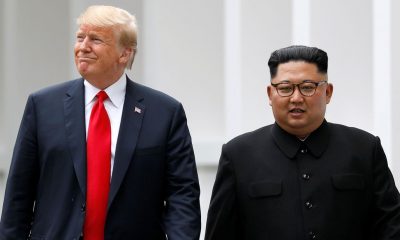World
North Korean special envoy begins Russia visit

Moscow: The special envoy of North Korean leader Kim Jong-un begins his week-long visit to Russia Monday, during which de-nuclearisation of the Korean peninsula will be discussed.
Choe Ryong-hae, a member of the politburo presidium and secretariat of the Workers’ Party of Korea would also focus on strengthening North Korea’s bilateral relations with Russia.
“There will be three sets of issues on the agenda,” said Russia’s Deputy Foreign Minister Sergey Ryabkov.
The first would be the issue of North Korea’s nuclear programme; to be more precise, the outlook for de-nuclearisation of the Korean Peninsula, Ryabkov stated.
“(The second issue would be) security in the north-east Asia. Besides, there is the theme of bilateral relations between Moscow and Pyongyang, which have gained certain momentum of late,” Ryabkov said.
The bilateral relations between the two countries, particularly their trade ties, have acquired a new dimension over the past few months.
Russia has written off North Korea’s debt and there are plans for building up bilateral trade to $1 billion by 2020.
Moreover, a project called “Pobeda” (Victory), with an estimated value of $25 billion, has been planned for the upgrade of the North Korean railways by a group of investors from Russia, in lieu of access to North Korea’s natural resources.
Specific joint plans for projects in energy and agriculture may also be discussed.
The two parties have also begun mutual settlements in the Russian rouble.
A business council will be established within the framework of the inter-government commission.
However, the Russian foreign ministry said that the unsettled nuclear problem of North Korea remains a brake on cooperation.
The outlook for resumption of the six-party talks on this issue requires frank discussion, Moscow believes.
Special envoy Choe’s visit will be the third visit by a senior North Korean envoy to Russia this year.
Last February, Russia welcomed the chairman of the presidium of the Supreme People’s Assembly Kim Yong-nam and last October, North Korean Foreign Minister Ri Su-yong had come calling.
World
Lockdowns in China Force Urban Communities to Defy Censorship and Vent Frustration Online

Shanghai’s rich middle class is leading a wave of online dissent over the strict and prolonged lockdowns imposed in various parts of the country. Chinese internet censorship is struggling as patience is wearing thin in many urban centers, coming up with creative forms of online protests.
Social Media Posts Revealing Lockdown Tension in Shanghai
Drawn-out lockdowns are nothing new in China as authorities insist with the nation’s zero-Covid policy since the start of the pandemic. Currently over This time around, however, metropolitan areas like Shanghai are increasingly difficult to keep quiet, given that its more than 25 million residents have seen weeks of total isolation along with food shortages and many other service interruptions.
Dozens of towns and reportedly over 300 million Chinese citizens have been affected by lockdowns of different severity. As expected, urban netizens have been most outspoken over their difficulties by finding creative ways to get around state censorship and bans placed on topics, news comments and spontaneous campaigns.
Shanghai residents have been using mobile proxies and hijacking seemingly unrelated hashtags to talk about healthcare issues, delivery failures and the overall severity of their situation. The “positive energy” that the Chinese government wants to transmit during the recent prolonged series of lockdowns does not come naturally to those counting food supplies and online censors are working hard to filter words, trending topics and undesired social media sharing.
WeChat groups and message threads are under constant monitoring. Posts questioning the zero-Covid approach have been quickly deleted, including by leading Chinese health experts like Dr. Zhong Nanshan. Video footage is soon censored and protests and investigations are quickly made to disappear.
Where this has not worked, officials have exposed banners with warnings and outright threats like “watch your own mouth or face punishment”, while drones have been patrolling the city skies. Yet, if anything, this has led to further tensions and unspoken confrontation with Shanghai’s educated and affluent middle class.
Creative Online Solutions Harnessing Civic Energy
Announcements by Chinese social media that they would be publishing the IP addresses of users who “spread rumors” have not helped either. Tech industry research has shown that much of Asia’s tech-savvy population has a habit of using mobile proxies and other privacy tools, quickly finding workarounds to browse the internet freely and talk to the world about the hottest topics.
The sheer volume of forbidden posts is already a challenge for the very censorship system, experts explain. Unable to track all trending hashtags, state workers overlook topics that speak about the US, Ukraine or other popular news. Linking human rights elsewhere to their situation, Chinese online dissidents establish their informal channels and “hijack” the conversation to share personal or publicly relevant information about the Covid suppression in their town.
Sarcastic and satirical posts still dominate. Others hope to evade the censors by replacing words from famous poems or the national anthem. One thing is certain – social media, when harnessed with the right creativity, has proven its ability to mount pressure on the government in even some of the most strictly controlled tech environments like China.























